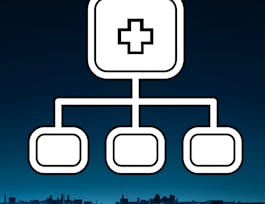Isn’t it time to end the loss of life from preventable medical errors?


Fixing Healthcare Delivery
Taught in English
Some content may not be translated
13,898 already enrolled
(134 reviews)
Details to know

Add to your LinkedIn profile
9 quizzes
See how employees at top companies are mastering in-demand skills


Earn a career certificate
Add this credential to your LinkedIn profile, resume, or CV
Share it on social media and in your performance review

There are 9 modules in this course
100,000 patients die annually as a consequence of preventable medical errors, and over 1 million patients suffer life-changing injuries. Despite the calls to action medical errors continue at the rate of 1 out of 10 patients. How can those of us who help to deliver care and those of us that receive care help to prevent harm? There are 5 fundamental areas each of us needs to understand and use to fix healthcare delivery: 1. Apply the principles of high performing manufacturers and athletic teams to continually improve our processes. 2.We all need to learn how lead and be part of multidisciplinary teams that include patients and coordinate the care they receive. 3.The human brain continually makes errors. Certain conditions increase the likelihood of errors, and these need to be avoided. Systems can be designed that force the right behavior, and second checks can help caregivers provide the right care at the right time and in the right place. 4.We all need to become effective leaders. Most importantly we must practice adaptive leadership, that is, leadership that promotes a true change in the way things are done. 5.Finally we all can utilize the campaign methods of successful politicians and advocacy groups to change the attitudes of our fellow caregivers and patients, and thereby change the culture of our healthcare systems. During this 8-module course you will be provided with the tools to accomplish all 5 of these goals, and as an individual you can truly make a difference. Why do we need to understand about systems? How do we evaluate a system and as a patient or provider what characteristics do you think are important? How does quality relate to safety? These are important questions that we all need to have answers to as we learn how to improve how we deliver and receive healthcare. The personal consequences of distracted physicians and defective systems are illustrated in Mary's frightening hospital experience.
What's included
6 videos1 reading1 quiz
In this module we will be discussing the manufacturing principles of the Toyota Production System. The concept of value stream or work flow diagrams will be introduced. The well known 80/20 rule in manufacturing will be applied to patient care. The 8 ways waste can be reduced in health care will be explored, and finally the problem of push medicine and how patients can guard against this all too common problem will be covered.
What's included
5 videos1 reading1 quiz
Teamwork is critical in modern healthcare. We will explore the state of healthcare teamwork in most healthcare systems. The 5 resources required for effective teams will be reviewed, and we will discuss how athletic principles can be used to encourage teamwork, improve efficiency and increase the quality of patient care. We will review how to launch and coach a team, and how to manage the complex dynamics of teams. Finally we will discuss how to create a self-improving team.
What's included
5 videos1 reading1 quiz
This module will be discussing the consequences of medical errors, and you will learn from Sorrel King's loss of her daughter, Josie, and from my personal experience that preventable injuries not only cause death but also can lead to permanent life changing injuries. Sitting around and doing nothing is not an option. However we all need to understand and use three key tools to determine the causes of medical errors and to fix them, Root cause analysis, Driver Diagrams, and PDSA cycles. Finally we will discuss the issue of small errors and our tendency to ignore and workaround them. Unfortunately this approach to small problems is one of leading causes for the continued high rate of preventable injuries and deaths in our hospitals and clinics. It is time to fix the little things.
What's included
5 videos1 reading1 quiz1 peer review
This module introduces you to the famous W. Edwards Deming red bead experiment that illustrates the tyranny of random variation, and introduce the use of run charts to differentiate random or common cause from specific cause variation. Next we will introduce you the concept of reliability and will illustrate why we need to dramatically improve the reliability in health care. Strategies for reducing human errors are reviewed, and the effectiveness hierarchy of different interventions discussed. We end with a discussion of how health systems and providers should be treating patients and families who they have inadvertently harmed.
What's included
7 videos1 reading1 quiz
In this module, we will be discussing the need in healthcare for distributive leadership that is adaptive. The complexity of healthcare prevents one leader from micromanaging a healthcare system, and leadership must be encouraged on the front lines of care. Effective leaders are good listeners, empathetic, follow their principles (North Star) and are courageous. Adaptive or innovative leaders are a necessity for improving the quality and safety of healthcare. The strategies for controlling emotional disequilbrium will be addressed, and specific analogies presented to assist students in understanding how to practice leadership that will bring about change.
What's included
4 videos1 reading1 quiz
Change requires those on the front lines to embrace new approaches to care and to work across department barriers. This session will use our Founding Father Samuel Adams to exemplify the approaches that have been used for decades to encourage others to come together to bring about change. Samuel Adams campaign led to United States independence from Great Britain and these methods if applied throughout the world can lead to a revolution in healthcare delivery. One-one techniques, personal narrative, creation of leadership teams, and the creation of effective strategies and tactics to bring about action will all be covered. You can make a difference.
What's included
5 videos1 reading1 quiz
In this final module we will review why many of us fail to change our viewpoints and behavior. We will discuss how you can overcome your natural immunity to change. Next we will review the key points from each of the past 7 module, and then outline a general plan of action that will allow you to create your personal plan to fix one component of your healthcare system. Your learning has just begun. Now you will be able to apply what you learned, you will achieve greater and greater understanding by doing.
What's included
4 videos1 reading1 quiz
This is the final exam.
What's included
1 quiz1 peer review
Instructor

Offered by
Recommended if you're interested in Healthcare Management

Universiteit Leiden

University of Michigan

Tecnológico de Monterrey

The University of North Carolina at Chapel Hill
Why people choose Coursera for their career




Learner reviews
Showing 3 of 134
134 reviews
- 5 stars
76.11%
- 4 stars
19.40%
- 3 stars
2.23%
- 2 stars
0.74%
- 1 star
1.49%
New to Healthcare Management? Start here.

Open new doors with Coursera Plus
Unlimited access to 7,000+ world-class courses, hands-on projects, and job-ready certificate programs - all included in your subscription
Advance your career with an online degree
Earn a degree from world-class universities - 100% online
Join over 3,400 global companies that choose Coursera for Business
Upskill your employees to excel in the digital economy
Frequently asked questions
Access to lectures and assignments depends on your type of enrollment. If you take a course in audit mode, you will be able to see most course materials for free. To access graded assignments and to earn a Certificate, you will need to purchase the Certificate experience, during or after your audit. If you don't see the audit option:
The course may not offer an audit option. You can try a Free Trial instead, or apply for Financial Aid.
The course may offer 'Full Course, No Certificate' instead. This option lets you see all course materials, submit required assessments, and get a final grade. This also means that you will not be able to purchase a Certificate experience.
When you purchase a Certificate you get access to all course materials, including graded assignments. Upon completing the course, your electronic Certificate will be added to your Accomplishments page - from there, you can print your Certificate or add it to your LinkedIn profile. If you only want to read and view the course content, you can audit the course for free.
You will be eligible for a full refund until two weeks after your payment date, or (for courses that have just launched) until two weeks after the first session of the course begins, whichever is later. You cannot receive a refund once you’ve earned a Course Certificate, even if you complete the course within the two-week refund period. See our full refund policy.


